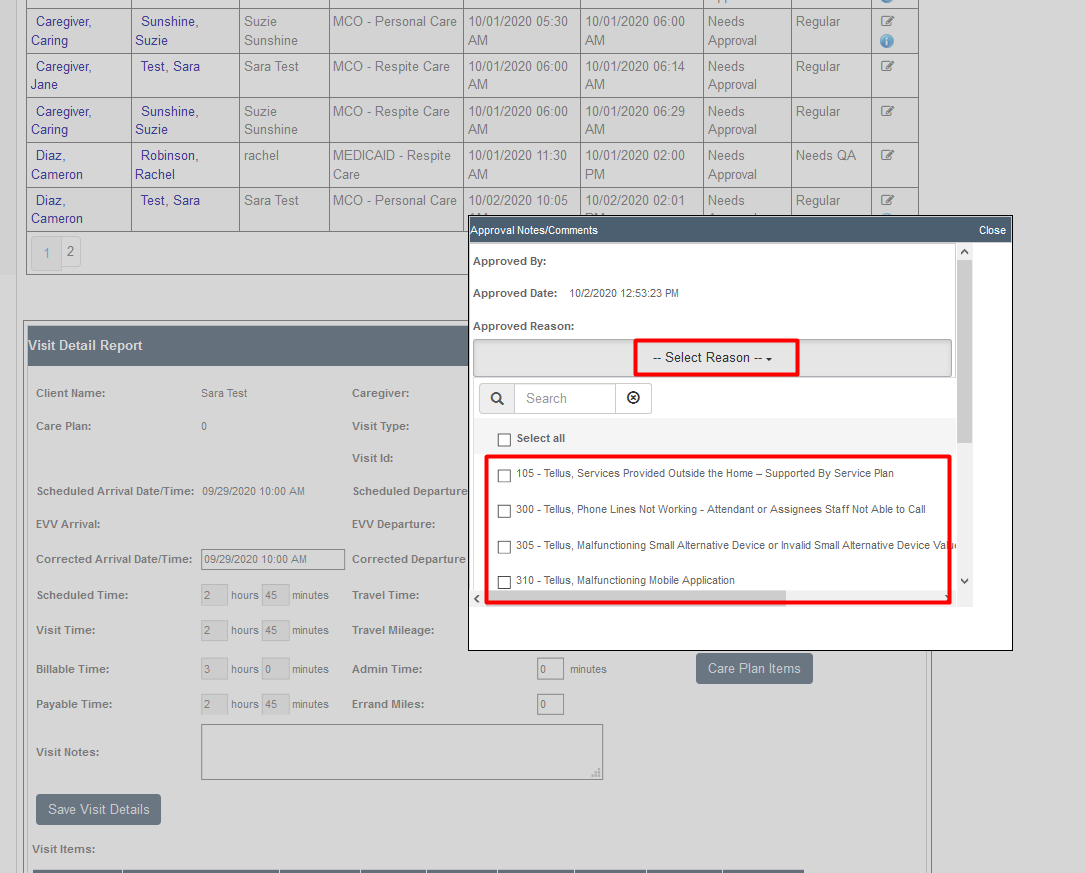Choosing NetSmart Reason Codes
Overview
For states where NetSmart (fomerly Tellus) acts as a clearinghouse, NetSmart requires a reason code any time critical EVV data is missing from your claim. In other words, if there is a missing EVV clock-in/out, missing/wrong telephony number, or missing GPS data on a visit which you plan to send to NetSmart, you must explain why by selecting the appropriate reason code during the approval process in the Visit Approval Dashboard.
Critically, the category (such as VVER, or "visit verification" category), matters more than the specific code you use. In other words, if you have a visit verification issue, you must use a visit verification reason code (marked VVER).
The chart below provides a list of your available reason codes, their descriptions, and directions on when to use them. If you are missing a reason code and believe it is needed in your system, please reach out to Ankota for assistance.
Categories
- VVER = visit verification category
- VLOC = visit location category
- VDUR = visit category
- VSTR = visit start category
- VIVR = visit IVR category
Reason Codes and Uses
| Reason Code | Description | When to Use This |
| 105 (VLOC) | Services provided outside the home | When the GPS collected does not match the expected location 105 should be passed. |
| 115 (VSTR) | Individual/Member agreed or requested attendant or assigned staff not work schedule | If the visit start time is greater than the time allowed by the payer (i.e. the schedule time is 9am but the EVV actual start time is 11:30am), but this was acceptable to the recipient, 115 should be passed. NOTE: NetSmart has also directed this code be selected if your caregiver clocks in or out at the wrong time (as in the case with new caregivers who did not understand to clock in at the start of service and clock out at the very end of service). |
| 200 (VVER) | Small Alternative Device has been ordered (NOTE: device = FOB) |
If the assigned staff is unable to check in and /or out because an alternative device is ordered but not arrived, code 200 should be passed. |
| 205 (VVER) | Small Alternative Device Pending Installation (NOTE: device = FOB) |
If the assigned staff could not check in and/or out because an alternative device was pending installation, code 200 should be passed. |
| 210 (VVER) |
Missing Small Alternative Device (NOTE: device = FOB) |
If the assigned staff is unable to locate the alternative device in order to check in and/or out, code 210 should be passed. |
| 300 (VVER) | Phone Lines not working – Attendant or assigned staff not able to call in. | When telephony is the designated method for EVV for a recipient, but the phone lines are not working at check in and/or out, code 300 should be passed. |
| 305 (VVER) | Malfunctioning small alternative device or invalid small alternative device value | When a small alternative device is the designated method for EVV for a recipient but the device malfunctions or returns an invalid value, therefore the assigned staff is unable to check in and/or out, code 305 should be passed. |
| 310 (VVER) | Malfunctioning Mobile Application | When a assigned staff is unable to check in and /or out because the mobile device malfunctions, code 310 should be passed. |
| 400 (VVER) | Individual/Member does not have a home phone | If there is no home phone available and IVR is the method of EVV, code 400 should be passed. |
| 405 (VVER) | Phone unavailable – Verified services were delivered | When IVR is the method of EVV but the phone is unavailable, code 405 should be passed. |
| 410 (VVER) | Individual/Member refused attendant or assigned staff use of phone – verified services were delivered | When IVR is the method of EVV but the member refused to allow the assigned staff to use the phone, code 410 should be passed. |
| 800 (VLOC) | GPS Coordinates Not Matched | If the GPS coordinates are not matched to the expected location, the code 800 can be passed. |
| 900 (VVER) | Attendant or Assigned Staff failed to call in or called in early/late– verified services were delivered | If the assigned staff fails to check in with EVV or checks in late, but checks out with EVV, and the services were delivered, code 900 should be passed. (This is rare as most EVV systems do not allow a assigned staff to check out without first checking in). The reason code is necessary as the invoiced start time will be different than the actual start time or there is no actual start time collected by the EVV system. |
| 905 (VVER) | Attendant or Assigned Staff failed to call out early/late – verified services were delivered | If the assigned staff fails to check out or checks out early or late, but the services were delivered, code 905 should be passed. The reason code is necessary as the invoiced end time will be different than the actual end time or there is no actual end time collected by the EVV device. |
| 910 (VVER) | Attendant or assigned staff failed to call in and out – or both the in and out times were late/early --verified services were delivered | If the assigned staff fails to call both in and out or both the actual start and actual end will be different from the invoiced start and invoiced end but the services were delivered, code 910 should be passed. |
| 915 (VIVR) | Wrong phone number – verified services were delivered | If IVR is the EVV method but the number collected is the wrong number, code 915 should be passed |
| 9098 (VVER) | Caregiver: Alternate Caregiver Performed Services. Verified Services Performed. | If a shift is completed by an alternate caregiver and the services are verified, code 9098 can be passed. |
| 9104 (VSTR) | Caregiver: Forgot to Check-In. Verified Services Performed | If the assigned staff fails to check in with EVV but checks out with EVV, and the services were delivered, code 9104 or 900 should be passed. This is rare as most EVV systems do not allow an assigned staff to check out without first checking in. |
| 9106 (VVER) | Caregiver: Forgot to Check-Out. Verified Services Performed | If the assigned staff fails to check but the services were delivered, code 9106 or 905 should be passed. |
| 9112 (VLOC) | Caregiver: Scheduling Mistake. Verified Services Performed. | If the assigned staff checks in or out from a location other than the scheduled location, for example, they forget to check out at the client home and do so at another location, the code 9112 can be passed to explain the location discrepancy. |
| 9114 (VVER) | eVV Device: Device Lost or Stolen. Verified Services Performed. | If the assigned staff is unable to check in or out due to a device that is lost or stolen, code 9114 can be passed. |
| 9116 (VVER) | eVV Device: Device Not Yet Operational. Verified Services Performed. | If the assigned staff is unable to check in or out because their device is not yet operational, code 9116 can be passed. |
| 9118 (VVER) | eVV Device: Malfunctioning Device. Verified Services Performed. | If the assigned staff is unable to check in or out because of a device malfunction, code 9118 can be passed. |
| 9120 (VVER) | eVV Device: No Phone/Device/Verification | |
| 9122 (VVER) | eVV Device: Recipient Would not Allow Caregiver to use their Phone. Verified Services Performed. | |
| 9124 (VVER) | eVV Device: Telephone/Telecommunications Unavailable or Failure. Verified Services Performed. | |
| 9126 (VVER) | General: Disaster or Emergency. Verified Services Performed. | |
| 9134 (VLOC) |
General: Services Provided at Alternate Location. Verified Services Performed. | |
| 9168 (VLOC) | Telemedicine | This code is used for ACHA BA (Florida) when telehealth services are provided as the recipient home address is different than the GPS location of the practitioner |
| 9170 (VDUR) | Acceptable per Payer Rule |
NOTE: Georgia users will likely want to use second address automatic reason coding to reduce flagged visits.


